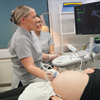Early pregnancy brings many changes to your body, some of which can be quite noticeable, while others may be more subtle. From hormonal shifts to physical transformations, your body is working hard to support your growing baby. Understanding these changes can help you feel more prepared for what’s ahead and manage any discomfort that may arise. Here’s a look at the key changes you may experience in the early stages of pregnancy:
1. Hormonal Shifts
One of the first things you’ll notice in early pregnancy is the rapid rise in hormones. The body produces increased levels of progesterone and oestrogen to maintain the pregnancy and support the developing baby. These hormonal shifts play a key role in many of the physical changes you’ll experience, from mood swings to morning sickness.
Impact on the Body: The surge in hormones can also cause fatigue, changes in skin, and heightened sensitivity to smells. You may feel more emotional, which is completely normal as your body adjusts to these new hormone levels.
2. Changes in Breasts
As your body prepares for breastfeeding, your breasts will undergo significant changes during early pregnancy. You may notice your breasts becoming larger, more tender, and feeling heavier. The skin around your nipples (areolas) might darken, and you may also see the development of small bumps on the areola called Montgomery glands, which help lubricate the nipples during breastfeeding.
Physical Discomfort: For many women, the tenderness and swelling of the breasts can be quite noticeable, particularly in the first trimester. Wearing a well-fitted bra can help alleviate some of this discomfort.
3. Weight Gain
While significant weight gain typically occurs later in pregnancy, you may notice some slight changes in your weight during the first trimester. It’s common to gain a small amount of weight in the early stages due to increased blood volume, fluid retention, and changes in your breasts and uterus. However, the amount of weight gained will vary from woman to woman.
Managing Weight Gain: The key during the first trimester is to maintain a healthy diet. Opt for nutritious foods that provide essential vitamins and minerals for both you and your baby. A balanced diet will support your body’s changes and promote healthy weight gain throughout the pregnancy.
4. Increased Blood Volume and Circulation
Your body will also increase blood volume to ensure that the baby gets the oxygen and nutrients it needs. This can lead to an increased heart rate and a feeling of dizziness or light-headedness in some women.
What to Expect: As your circulation improves, you might notice that your skin appears more flushed, and your veins may become more visible. This is a completely normal part of pregnancy and a sign that your body is adjusting to the new demands.
5. Digestive System Changes
Hormonal changes can also affect your digestive system. Many women experience symptoms like nausea, bloating, and constipation in early pregnancy, often referred to as morning sickness. Progesterone can relax the muscles in the digestive tract, making digestion slower and causing some discomfort.
Managing Symptoms: Eating smaller, more frequent meals and staying hydrated can help alleviate digestive issues. If morning sickness becomes severe, it’s important to speak to your healthcare provider for advice and support.
6. Skin Changes
Pregnancy hormones can also have a noticeable effect on your skin. Some women experience a “pregnancy glow” due to increased blood flow, while others may notice changes such as dark spots, acne, or a condition known as the “mask of pregnancy” (melasma), which causes dark patches on the face.
Caring for Your Skin: While skin changes are common, it’s important to use gentle skincare products and protect your skin from the sun. If you experience severe skin issues, speak to your doctor for guidance.
7. Increased Urination
As your uterus grows and hormones fluctuate, you may find yourself needing to urinate more frequently. This is especially common in the first trimester and can continue throughout the pregnancy. The increased blood flow to the kidneys and the growing uterus putting pressure on your bladder contribute to this frequent need to visit the bathroom.
Managing Discomfort: Make sure to drink plenty of water to stay hydrated, but if you’re finding frequent urination uncomfortable, try limiting fluids before bed to avoid disrupted sleep.
Conclusion
Your body is going through numerous changes in early pregnancy, all designed to support the growing life inside you. While some changes, such as weight gain, breast changes, and hormonal shifts, can be challenging to adjust to, they are all part of the natural process of pregnancy. By understanding these changes and how to manage them, you can better navigate the first trimester and embrace the exciting journey ahead.













 Packages & Prices
Packages & Prices  Important Info & Policies
Important Info & Policies  Your Scan
Your Scan